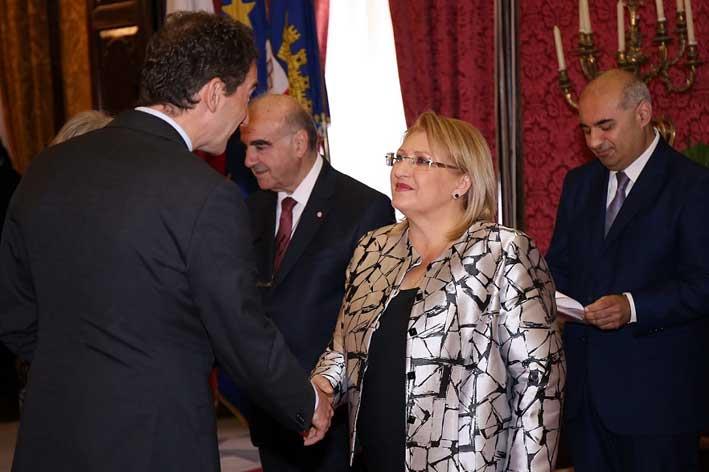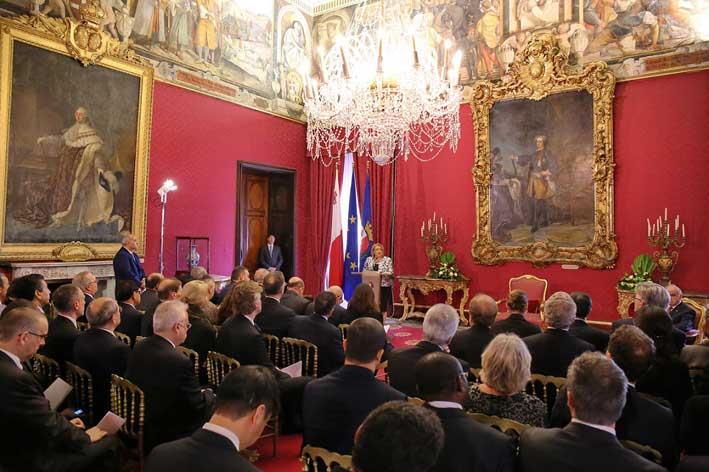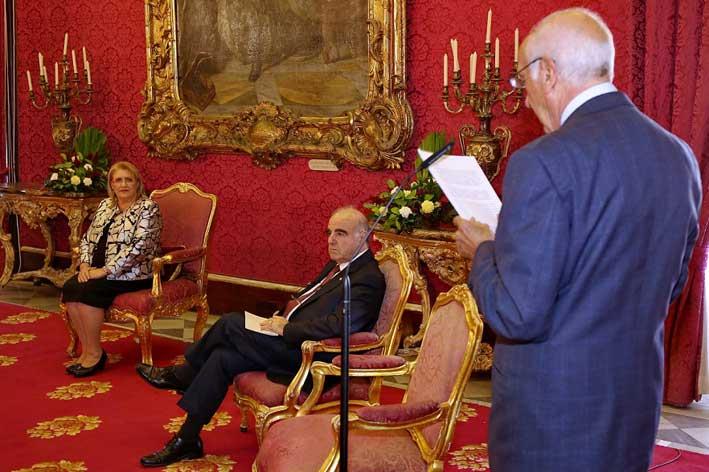The following is an extensive reproduction of the text of the speech given by President Marie Louise Coleiro Preca during her annual meeting with ambassadors and diplomats today
At this time last year, I pointed out that the year before had been an eventful one, both locally and internationally. I am sure you will agree with me that 2015 has been even more eventful than its precursor.
Last year, the international community provided alternative discourse meant to bring about a change in people’s lives, mainly through the United Nations Summit in New York, and the United Nations Climate Change Conference held in Paris.
Malta also hosted its fair share of international fora for the discussion of very important subject matter, namely the Valletta Summit and the Commonwealth Heads of Government meeting.

The United Nations Summit in New York brought the unanimous agreement of all nations around the Sustainable Development Goals. It was a particularly significant moment in history, when countries made a commitment to saving all of humankind, by ending poverty, and leaving no one behind, as well as protecting the planet for the sake of our children, and ensuring prosperity for all.
Whether the Sustainable Development Goals will be achieved by 2030 is still to be seen, and depends on the level of commitment, countries, people and communities, are prepared to make.
Undoubtedly, ending poverty, in all its forms and dimensions, including extreme poverty, is the global challenge that underpins all the other Sustainable Development Goals.
If the international community truly aims to eradicate poverty, it needs to realise that poverty is rooted in political, social and economic injustices, and it is these injustices and inequalities that have to be addressed with urgency.
Some countries are currently registering significant economic growth. Unfortunately, millions of people living within these same economic zones are still living in poverty, or are still facing the same precarious situations, with devastating consequences for their present and future. I believe policymakers need to change their approach, and be more comprehensive in their policy formulation. The poor and hungry of the world cannot wait any longer, and cannot afford our complacency or lack of action.

Another equally important concern for us all is, undoubtedly, that of the environment. I strongly believe that there is the inherent need to preserve the world’s natural heritage for our future generations.
In 2015, we witnessed the signing of the historic outcome of the United Nations Climate Change Conference in Paris, where 195 nations committed to take action to combat climate change and invest in a low carbon, resilient and sustainable future.
I am fully aware that, in order to move from words to action, appropriate financial commitments have to be made, particularly to provide adequate support to developing countries and those most vulnerable to consequences of climate change, particularly small island nations like Malta.
One way that this can be achieved is to anticipate the adverse effects of climate change and take appropriate action, to prevent, or minimise, the damage being caused. Proper planning and pre-emptive action may be the only way we can save lives and our quality of life. However, I reiterate that there also needs to be international cooperation among cities and regions, businesses and civil society, if we are to affect any remarkable change. We need to act together as one to save our planet.
In the local context, the past year has also been a notable one. Initiatives such as the Valletta Summit that took place in Malta are an excellent opportunity for us to come together and hopefully find constructive ways of responding to the realities of migration. We need more spaces like the Valletta Summit, which was a unique opportunity because it brought together leaders from Europe and Africa under one roof and across the table.

Malta once again acted as a bridge between two continents, a bridge between two different worlds that need so much to now come together to address migration as a common concern.
Therefore, I believe that the dialogue initiated in Valletta, cannot, and must not, be viewed as a one-off occasion, but must continue, if we are to change the fate of so many people risking their life for better opportunities.
Economic, social and environmental dimensions all impinge on migration, and this is why any discourse on sustainable development must include migration as a cornerstone. It is with great satisfaction that I see this concern included in the agreed United Nations Sustainable Development Goals, and I commend everyone involved, for having the courage and vision, to acknowledge this, from a human rights standpoint. We need to view migration positively in this sense, and hence, we need to build bridges, not walls or borders. I advocate that our approach to migration should be realistic, humane, comprehensive and proactive, at global, regional and community levels.
Last year, Malta also hosted the Commonwealth Heads of Government Meeting (CHOGM).
This important event brought together fifty two Heads of State, representing more than 2.2 billion people around the globe.
In my address at the opening of the first-ever, Women’s Forum being held just prior to the Commonwealth Heads of Government Meeting, I highlighted the contribution women can make towards the political, economic and social impact on our communities, on our own countries and ultimately, on the world.

Unfortunately, we are all becoming familiar with the rise of violent extremism, terrorism, and the exploitation of the vulnerability of women and girls.
Rape and systematic sexual and gender-based crimes are still the order of the day. Other realities for women across the globe include restrictions in education, access to healthcare and participation in public life, to mention a few. Sometimes, women’s situations are made even worse by natural disasters and humanitarian crises.
Women are still mainly victims of conflict, or else are activists marching for peace, when they should also be leaders taking decisions alongside their male counterparts.
I truly believe that leadership by women can make a difference in international peace and security by offering a complementary perspective, through a process of dialogue.
Unfortunately, this past year, I personally witnessed Paris, transformed into a mournful city, totally shaken by the heinous terrorist attacks, though but not defeated in spirit. Throughout 2015, much to our disappointment and outright condemnation, mass atrocities against humanity continued relentlessly, in Mali, in Egypt, in Turkey, Beirut, Nigeria, Tunisia, Libya, Afghanistan, Yemen, Iraq, Palestine and Syria. The list is endless.
Through acts of terror, lives are being destroyed, families torn apart, and livelihoods disrupted. Our peace of mind is under attack, by the purveyors of fear and terror. We are confronted, in the acts of directed cruelty, by a stark reminder of the evil that hides behind a mask of ideology, of perverted religion, of disordered culture. Yet this cannot continue to be so.
In 2015, I had the opportunity to share my vision for the future with my fellow world leaders,on a number of occasions: at the Arraiolos meeting for non-executive Presidents held in Germany, at the Council of Europe, the European Union, at the United Nations Summit, at the
World Leaders Forum at Colombia University in New York and lately, at the UNESCO World Leaders Conference in Paris. I hope to continue to dialogue with my counterparts in striving to bring peace among nations.
The reality is that we are at a crossroad, at a moment in time where unity and global solidarity are of key importance.
Yet, Europe continued to witness a marked increase, of mainly young people, that have sought to travel to join terrorist groups. This group of young people seem to be mostly perplexed by where to place their trust and by the negativity of our societies. We must ensure that the youths of today are not marginalized and neglected but feel that they are valued and that their voices are heard, never forgetting that the future for all of us lies with them.
Although I believe that we should seek to address this phenomenon through legal instruments, we need to delve deeper on the causes that are encouraging young people on making such a journey and be part of this terrorist movement. We should also note the return of these radicalized young people turned fighters that may have potentially disastrous effects on their home countries and communities.
Given the geographic location of Malta, I believe that Malta is in an ideal position to contribute, not only to the stability in our region, but also could serve as a regional catalyst to counteract terrorism, radicalisation and violent extremism, by promoting a culture of peace, justice and religious tolerance.